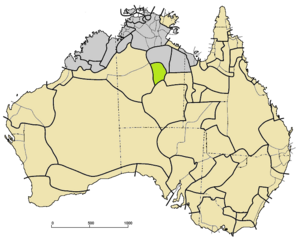Warumungu language facts for kids
Quick facts for kids Warumungu |
|
|---|---|
| Region | Northern Territory, Australia |
| Ethnicity | Warumungu people, Kunapa |
| Native speakers | 321 (2016 census) |
| Language family |
Pama–Nyungan
|
| AIATSIS | C18 |

Warumungu (green) among other Pama–Nyungan languages (tan)
|
|
The Warumungu (also called Warramunga) language is spoken by the Warumungu people. They live in Australia's Northern Territory. Besides speaking, the Warumungu people also use a special sign language. It is a very developed way of communicating with hand signs.
Contents
What Kind of Language is Warumungu?
The Warumungu language belongs to a large group called Pama–Nyungan languages. This is one of the biggest language families in Australia. Warumungu is similar to the Warlpiri language, which is spoken by the Warlpiri people.
A Look at Warumungu History
In the 1870s, early explorers from Europe visited the Warumungu people. They described the Warumungu as a strong and thriving group. However, by 1915, the Warumungu faced many challenges. Their way of life was greatly affected by new arrivals.
Later, in 1934, land that was meant for the Warumungu people was taken away. This happened so that people could look for gold. By the 1960s, the Warumungu people had been moved from their traditional lands.
How Many People Speak Warumungu Today?
Warumungu is still a living language. This means people still speak it. However, for a while, the number of speakers was getting smaller. In the mid-1950s, an expert thought about 700 people spoke some Warumungu. By 1983, that number was estimated to be only around 200 speakers.
But good news! The language has seen a comeback. Today, Warumungu is doing much better than many other Indigenous Australian languages. Children are learning it, and people of all ages use it every day. This means the language is strong and likely to continue. Some people in the group might also speak Kriol, which is another language.
How Warumungu Words Are Made
Warumungu is a "suffixing" language. This means that small parts, called suffixes, are added to the end of verbs to change their meaning. For example, a suffix might show when something happened (like past or future). Some verbs are also made by joining two words together.
Like many other Indigenous Australian languages, Warumungu is changing quickly. Younger speakers might use words and grammar a bit differently than older speakers. Here is an example of a Warumungu sentence: apurtu im deya o warraku taun kana. This means, 'father's mother, is she there, in town, or not?'.
 | Valerie Thomas |
 | Frederick McKinley Jones |
 | George Edward Alcorn Jr. |
 | Thomas Mensah |

